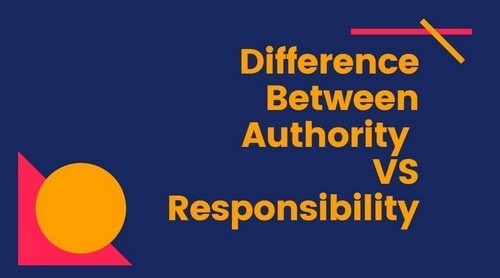Understanding the difference between authority and responsibility is crucial in the world of management and leadership. These two concepts, though often intertwined, hold distinct meanings that reflect the dynamics of power and accountability in any organization.
You must have heard the phrase that authority comes with responsibility, which means a person who has authority also has responsibility. The person who has authority can legally give orders to his subordinates and ask them to perform certain tasks.
However, responsibility, on the other hand, is the duty of a human being or employee to perform a job. Both superior and subordinate have the responsibility to complete the job, but only a superior can have the authority to give orders and compel them to perform tasks.
In this article, you will learn about both authority and responsibility with the help of examples and key differences between both of them.
Table of Contents
What is Authority?
An authority is a power to give orders and ask your subordinates to perform certain duties. Authority can be given to a person by government executives, the owner of an organization, or by the representatives of GOD.
An authority is a legitimate power to influence people to compel them to perform the task given to them. For example, a mob has the power to punish a criminal, but they don’t have legitimate authority to punish the criminal.
The authority lies in the hands of the law. Similarly, in an organization, the authority lies in the hands of a manager to get organizational tasks accomplished by his subordinates.
However, the authority of the manager is limited to a particular department of the organization. He has no authority over his employees outside the organization.
Authority is the consequence of the position of an individual in an organization. A person can only be in the superior position of the organization if he has authority; a person with no authority can never be in the top position of an organization.
Therefore, the degree of authority is highest at the top level, and its degree keeps on decreasing the levels of the organization. That means only a person at the top level can give orders to the people at a low level and can compel them to perform tasks given to them, and a person at a lower level can’t give orders to the people at the top of his peers.
Authority can be of two types such as official authority (where authority is given to a person by the organization he works for), and other is personal authority (where authority is given to a person because of his ability to influence people in the organization.
Examples of Authority
- CEO of a company: The chief executive officer (CEO) has the ultimate authority in an organization. They have the power to make major corporate decisions and manage the overall operations of a company. Their authority is based on their position and is recognized by all members of the organization.
- Team Leader in a Project: A team leader in a project has the authority to delegate tasks to team members, make major decisions related to the project, and guide the team toward the completion of the project. This authority arises from the task assigned to them by the organization.
- Police Officer: A police officer has the authority to enforce laws, maintain order, and protect the community. This authority is granted by the government and is recognized legally.
- Teacher in a Classroom: A teacher has the authority to set rules in a classroom, decide on the course content, and grade students. This authority arises from the role assigned by the educational institution.
- Doctor in a Hospital: A doctor has the authority to diagnose illnesses, prescribe treatments, and advise patients. This authority arises from their professional qualifications and the responsibility assigned to them by the health institution.
What is the Responsibility?
Responsibility is a moral duty or an obligation of an employee, whether he is a manager or subordinate to fulfill the task given to them. The responsibility starts as soon as the job is assigned to the employee and finishes with the completion of the task.
When assigned responsibility for a particular job, it becomes your duty to execute tasks as directed. This operating responsibility refers to the operating duties one has over a job, often requiring you to enforce obedience to the rules to ensure smooth workflow.
The person is responsible for the consequence of his performance in the task. The responsibility comes with authority. A manager is responsible for the accomplishment of the task. The responsibility moves upwards in the organization from a lower level of employees to the upper level of management.
The responsibility originates from the superior-subordinate relationship in an organization. Because of this relationship, the manager can do a task for his subordinates with responsibility.
Examples of Responsibility
- Business Owner: A business owner is responsible for the day-to-day running of the company. It is their responsibility to ensure that the financial, legal, and operational aspects of the business are all running smoothly.
- Manager in an Organization: A manager is responsible for leading a team of employees towards a common goal. They must ensure that tasks are completed on time and to a high standard while also motivating their team and fostering a positive working environment.
- Employee: An employee is responsible for completing an assigned task and adhering to the company’s rules and regulations. They are expected to show up on time, work hard, and maintain a professional attitude while at work.
Key Differences between Authority and Responsibility
- Definition: Authority refers to the rights and powers granted to a person or organization to carry out a task. Responsibility is the obligation or accountability that is assigned to an individual for performing certain tasks.
- Origin: Authority originates from the official position held in an organization, while responsibility arises from the duties assigned to that position.
- Flow: Authority flows downwards, from superior to subordinate, whereas responsibility flows upwards, from subordinate to superior.
- Delegation: Authority can be delegated to subordinates, but the ultimate responsibility cannot be escaped by the person who delegates authority.
- Freedom: Authority brings with it the power and freedom to make decisions, whereas responsibility imposes an obligation to perform assigned tasks successfully.
- Enforcement: Authority refers to the right to enforce rules and decisions, while responsibility involves the expectation to complete tasks and achieve goals.
- Nature: Authority is legal and formal, signifying a right to command. In contrast, responsibility is ethical and social, indicating an obligation to perform a task.
- Existence: Authority may cease to exist after the task is performed, but responsibility exists until the goal is achieved.
- Transferability: Authority can be transferred or reassigned, while responsibility is absolute and cannot be entirely transferred.
- Accountability: Authority is accountable for the exercise of power, while responsibility is accountable for the performance of the assigned tasks.
- Control: Authority controls the actions of others, while responsibility controls the actions of the individual assigned with the responsibility.
Comparison Chart Authority vs Responsibility
| Authority | Responsibility |
|---|---|
| An authority is a power or right that a person gets because of his designation, role, or job. | A responsibility is an obligation that an employee has to fulfill the work bestowed on him |
| An authority is the outcome of a formal position in an organization. | A responsibility is the outcome of a superior-subordinate relationship. |
| An authority is a legal right given to a person. | A responsibility is consequence of authority. |
| It is a delegation of authority. | It is an assumption of responsibility. |
| The flow of authority is from the upper level to lower level. | The flow of authority is from lower level to upper level. |
| Authority requires the ability to give orders. | Responsibility requires the ability to follow orders. |
| The authority lasts for a long period of time. | The responsibility ends as soon as the work bestowed on the employee is complete. |
| The objective of the authority is to make decisions and implement them effectively. | The objective of responsibility is to perform duties effectively assigned by the superiors. |
How Authority and Responsibility are connected?
Authority and responsibility are interconnected concepts that ultimately ensure the smooth functioning of an organization. Authority gives the power to command, whereas responsibility holds one accountable for achieving the desired results.
Authority without responsibility may lead to chaos and irresponsibility, while responsibility without authority can lead to confusion and inefficacy. Therefore, it is essential for every organization to maintain a balance between both, so as to ensure success and better results.
Hence, authority is the right to command while responsibility is the obligation to perform assigned tasks successfully. Authority and Responsibility are interconnected concepts that must be kept in harmony for the organization to function properly. By understanding their differences and connections, organizations can make informed decisions on how best to allocate resources and assign tasks to ensure the best results.
Conclusion!
In the end, authority and responsibility are two sides of a coin. Responsibility comes hand in hand with authority. However, it is important to bestow some responsibility to a subordinate to make sure that the task is performed successfully.
Greater authority comes with greater responsibility. The one who enjoys authority with no responsibility can never accomplish the work given to him successfully. Therefore, it is important to ensure a balance between authority and responsibility.
Everyone in the organization has authority as well as responsibility, but the degree of both varies from the lower level to the upper level.
FAQs
How authority, responsibility, and accountability are different from each other?
The main difference between authority, responsibility, and accountability is that while authority refers to the power to direct and influence others; responsibility refers to an obligation to perform a task assigned; and accountability means being answerable for one’s actions.
How to be responsible?
The best way to be responsible for your duties is to take ownership of the tasks assigned and execute them efficiently. It is also important to know the lines between authority and responsibility so that one can assign responsibilities effectively. Additionally, it is important to have a genuine desire to accomplish the assigned task. One should also consider delegating work when necessary and strive hard for success. Lastly, it is important to take responsibility for any mistakes and learn from them.
How to be accountable?
To be accountable for your actions, it is important to clearly define the roles and responsibilities of each team member. Additionally, one should have clear expectations and communication between relevant stakeholders. It is also essential to have regular reviews on performance and progress in order to stay accountable. Finally, it is important to document all decisions taken and hold oneself accountable for any mistakes or shortfalls.
How to use authority?
Authority is used to assign responsibility and enforce obedience. When using authority, one should focus on setting clear objectives for the team members and providing them guidance when needed. Additionally, it is important to provide feedback regularly so that the team can understand expectations. You should use it to motivate people to achieve their goals and not just demonstrate power.
Liked this post? Check out the complete series on Management



i really like the topics that you offer. i am interested in Small Business Marketing.
currently, i am a teacher at Rumbek University. the entity is a government school. salaries come after two to three months. this makes life a hassle. so i would like to take up a samll business course with you.
thanks.
maker Biar angeth, Rumbek South Sudan.
Hi. You can view all our courses on Digiaide. We have all courses for Academics, professionals and Businesses.